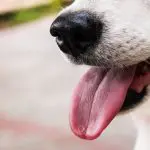Japanese akita inu, big and powerful
Bred in Japan, many years ago.
The Japanese Akita is not a suitable dog as a normal family pet. It was originally bred in the Akita Prefecture in Japan, as a hunting dog, for deer, wild boar and even bears. For this purpose, it required to be a large, strong dog with confident, dominant tendecies and an independent nature. The Akita is also known as Akita Inu, which is Japanese for dog.
The average height for the Akita is between 24 to 28 inches and will weigh from eighty to one hundred and ten pounds. He has strong, heavy bones and a muscular body. This is a lot of dog!
The Akita has a double coat, which is harsh and waterproof, with a thick, dense undercoat. It sheds profusely, all year round and requires brushing and grooming every day. The coat can be white, brindle or tan and any mix of these. The dense coat of this breed means that he is happy in the snow but he will suffer in a hot climate.
This is not a dog for inexperienced owners, or for people who are elderly or weak. Akitas are intelligent and athletic and when socialized are faithful and affectionate but will always strive for the dominant position in the family group. He may show aggression towards family members and may not suit a family with small children. With this breed, it is vital that you are the Alpha Dog and that he knows his place in your “pack”!
The Akita may show aggression towards other dogs and small animals and should not be allowed to roam off-leash in public areas where there are many people and other dogs.
Training Akitas
The Akita can be difficult to train because they are intelligent and stubborn and can quickly become bored. it should never be a question of “asking” an Akita to do something. It must always be a strong command from a dominant owner. When you say “NO”, mean it and make it stick. You may have problems with house training, as Akitas suffer from urinary infections in infancy.
There is plenty of information available online, much of it Free, on the subject of Dog Aggression. Any dog which shows undue aggression, to people or animals, is in urgent need of proper expert training.
If you take an Akita into your family, you must be prepared to spend time and effort on training, socializing, excercise and grooming. This large dog also costs a lot to feed.
Akitas in the Family
There are conflicting opinions about the suitability of Akitas with young children. Historically, the breed had a strong reputation for being protective of young children and were often left in sole charge. Other opinions point out the dominant nature of the breed and the fact that these dogs will compete for their place in the pack. Certainly, a young child will be no match physically for an adult Akita.
Proper supervision of the behavior of the dog and the children is essential in this situation. Having said this, a well socialized Akita will be more comfortable with this.
Akitas make extremely good guard dogs. They have a strong territorial instinct and will be very protective of family and property. As a watch dog, they are quietly effective. They do not bark unnecessarily but will certainly raise the alarm at the approach of any strange visitors or sounds.
The average lifespan of the Akita is about 12 years. Like many other breeds of dog, cancer is the most common cause of death. Recent surveys in both the United Kingdom and the USA/Canada revealed this to be the case, with other causes including cardiac and bloat/torsion.


